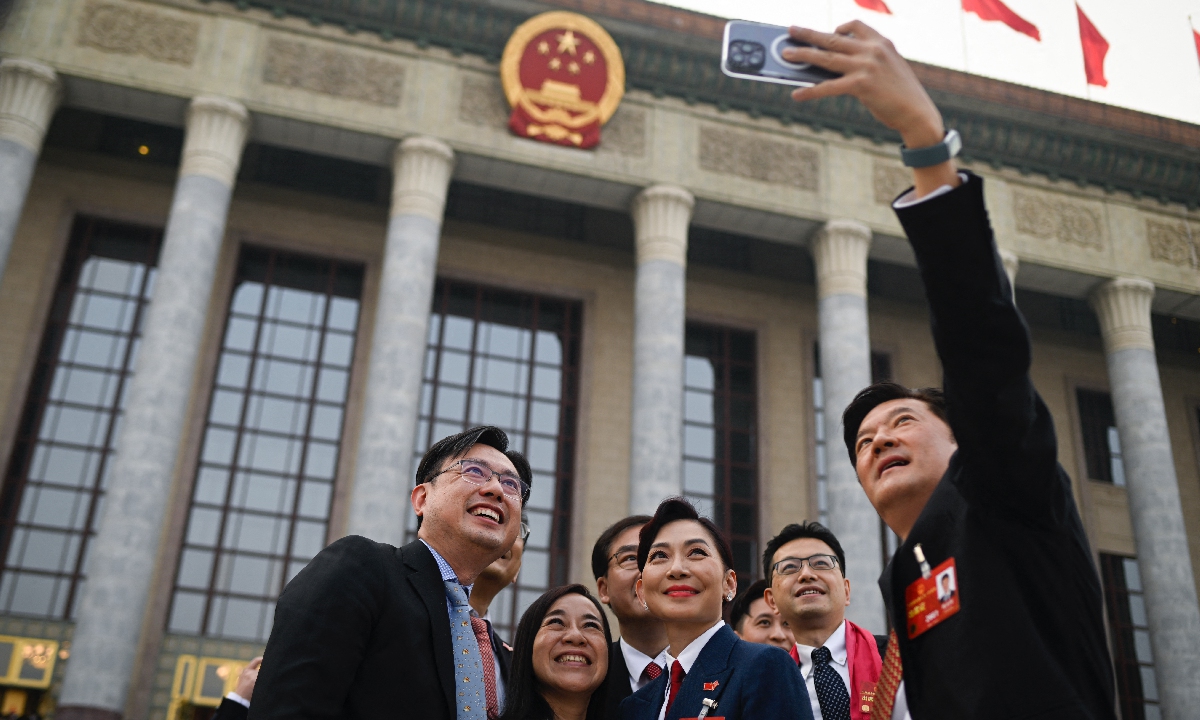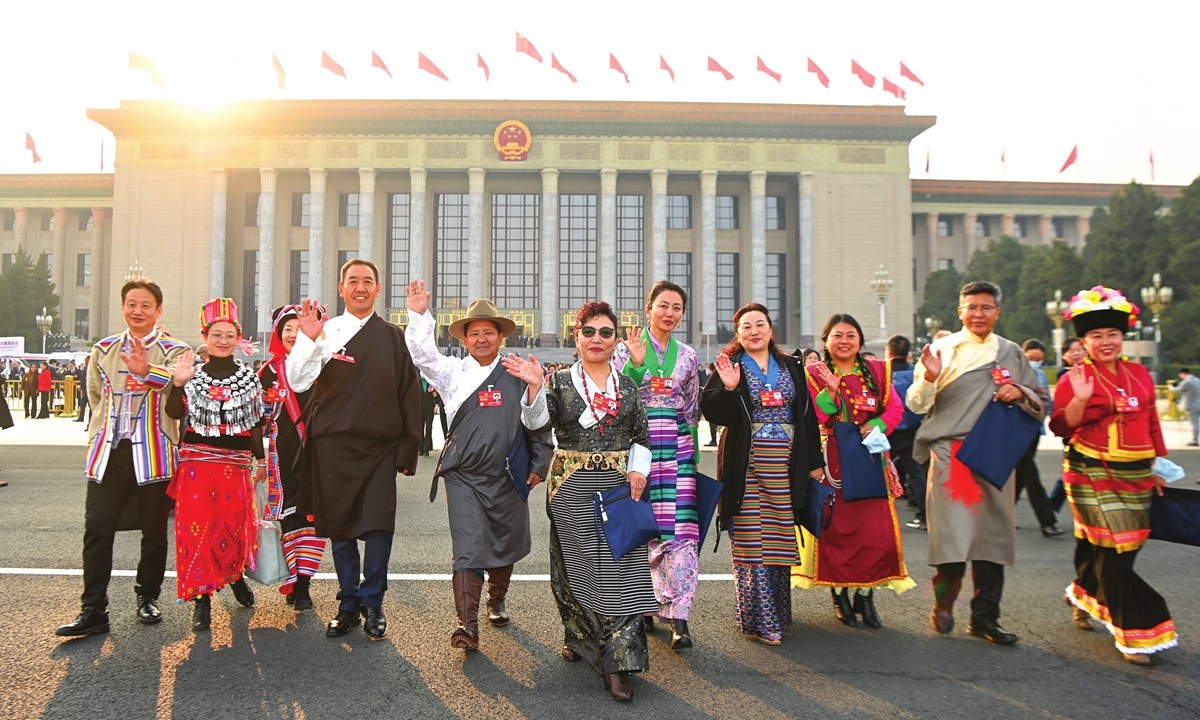
Thousands of national lawmakers and policy advisors are already halfway through this year’s two sessions – an important opportunity for the world to understand the whole-process people’s democracy, which is fundamentally different from Western-style democracy, often characterized by electoral politics. Some deputies to the 14th National People’s Congress (NPC) have refuted “rubber stamp” claims made by some Western media and observers about the main annual political gathering, saying Chinese democracy is high quality democracy that leads to concrete results, making people’s lives better and the country stronger.
On Thursday, NPC deputies held group meetings to deliberate the work reports of the Supreme People’s Court and the Supreme People’s Procuratorate. They also held meetings to deliberate the draft decision on the plan for the reform of State Council institutions, holding discussions and consultations on candidates for the president and vice president of the People’s Republic of China (PRC), chairperson of the Central Military Commission of the PRC, as well as chairperson, vice chairpersons, and secretary-general of the NPC Standing Committee.
The Chinese People’s Political Consultative Conference (CPPCC) session also held group meetings on Thursday to deliberate draft resolutions and reports, draft election methods and draft candidate lists. They recommended and elected scrutineers and prepared for the elections.
The NPC and CPPCC are an important platform to showcase the whole-process people’s democracy, reflecting how much top Chinese lawmakers and policy advisors care about people’s livelihoods by making efforts to turn people’s expectations into reality, some experts said.
The whole-process people’s democracy is not just a narrowly-defined democracy with periodic voting rights, but a combination of electoral and consultative democracy including elections, consultations, decision-making and oversight, which covers economic, political, cultural, social and ecological sectors, they noted. 
Members of the Chinese People’s Political Consultative Conference (CPPCC) National Committee walk out of the Great Hall of the People after the opening meeting of the first session of the 14th National Committee of the CPPCC held in Beijing on March 4, 2023. Photo: VCGCountry run by the people
Li Yan, President & CEO of Qilu Pharmaceutical Group, has submitted more than 60 motions in the past six years while serving as an NPC deputy. Most of her motions are related to social and livelihood issues such as adolescent education and healthy growth, public health services and environmental protection, Li told the Global Times on Thursday.
“As a business manager, I have very little spare energy. It is very challenging for me to carry out long-term special research on a certain issue. However, I fully combine fulfilling the responsibility of being an NPC deputy with my work, and give full play to our group’s resource advantages,” Li said.
For example, Li said she often deals with medical experts and participates in important national academic conferences related to medicine and pharmacy. While communicating with professionals, she will learn about many medical and health issues and naturally find answers to these issues during following work and communication, forming a wealth of advice materials for the NPC.
“There are more than 36,000 employees across the country in our group. I also pay attention to the problems they face in work and life,” Li said.
The three motions Li brought to this year’s two sessions focus on strengthening scientific literacy education for primary school students, guiding minors to use the internet sensibly, and strengthening treatment for maternal depression. The inspiration for these three suggestions came from the female employees of the Qilu group and were eventually formed after supplementary research on the social level, according to Li.
As the top legislature, the ongoing 14th NPC brings together 2,977 deputies from an array of professions and backgrounds. Among them, 442 are from ethnic minority groups, accounting for 14.85 percent of the total and cover every one of the 55 ethnic minority groups, the latest official figures showed.
Official data also showed that in 2022, offices and departments under China’s State Council handled 8,721 suggestions from NPC deputies and 5,865 proposals submitted by the CPPCC National Committee members, accounting for 94.8 percent and 95 percent of the total respectively. Around 4,100 motions and proposals were adopted, which were turned into 2,100 policies and measures.
Roy Chu Lap-wai, a Hong Kong deputy to the 14th NPC, formerly served as district councilor in Hong Kong, believes that the whole-process people’s democracy is people-oriented and pays close attention to people’s expectations.
“I have been engaged in grassroots work in Hong Kong for a long time, contacting people with different social backgrounds and working together to solve various social problems. After being elected as a deputy to the NPC, I continue listening to the opinions of the public in Hong Kong about the country’s development,” Chu said.
Living in Hong Kong, an international metropolis, Chu and other deputies from Hong Kong have a deep understanding of the country’s whole-process people’s democracy, particularly when it’s compared with Western-style democracy.
“The biggest difference between Western-style democracy and China’s whole-process people’s democracy is that the West focuses on electoral democracy and tests democracy through checks and balances and referenda, which does not necessarily solve social issues,” Chu said, noting that in order to win elections, politicians use “appealing slogans” to woo voters and even stage political farces.
Defying Western-style democracy
In the words of Xi Jinping, general secretary of the Communist Party of China (CPC) Central Committee, “Whether a country is democratic or not depends on whether its people are truly the masters of the country. It depends on whether the people have the right to vote, and more importantly, the right to participate.”
Good democracy must achieve good governance and promote the country’s development, Zhang Shuhua, director of the institute of political sciences at the Chinese Academy of Social Sciences, told the Global Times on Thursday.
Deputies are an important bond for people’s democracy to be practiced throughout the whole process. By performing their duties, deputies promptly report the most direct and realistic problems of the public to the CPC committees and governmental departments, and give positive guidance and explanation for the problems that are temporarily difficult to solve while putting forward proposals and suggestions, Zhang said.
China has increased the number of local legislative outreach offices to 32, and now covers all provinces, autonomous regions, and cities directly under the central government, according to a report on the work of the Standing Committee of the NPC delivered at the first session of the 14th NPC on Tuesday.
The country has also made progress on the Digital NPC project, in which a unified national platform for recording and reviewing normative documents has been developed and a platform for online submission of suggestions for review from citizens and organizations has been opened, according to the report.
In some countries with so-called liberal democracy, democracy is often short-term and intermittent, and people only have the right to vote but lack daily channels to express their interests, Zhang noted.
“Democracy is a common value for all mankind, but different countries have their own paths to realizing democracy. It’s time to get rid of the myth of Western-style democracy,” the expert said.




प्रतिक्रिया